-

EPISODE 1: Welcome to the First National Security Podcast for Cleared Professionals.
Cleared for Discussion is the first of its kind national security podcast specifically designed for cleared professionals across all industries in federal government contracting.
-
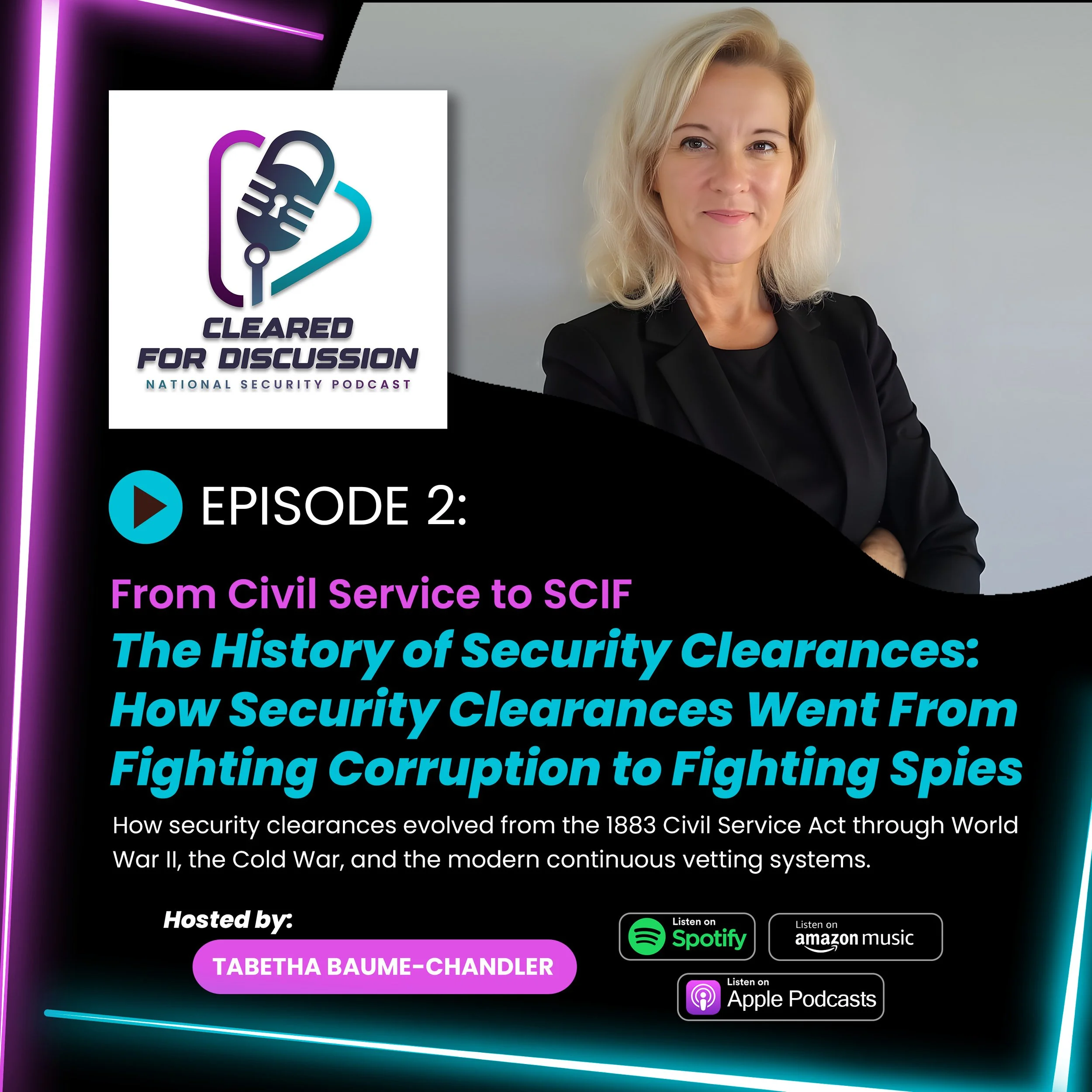
EPISODE 2 | From Civil Service to SCIF
In this powerful second episode of the CFD Podcast, host Tabetha takes listeners on a deep dive through the rich history of the U.S. security clearance system. From the Civil Service Act of 1883 to the modern-day SCIF, the episode explores how national security, political reform, and private industry partnerships shaped the clearance landscape we know today.
-
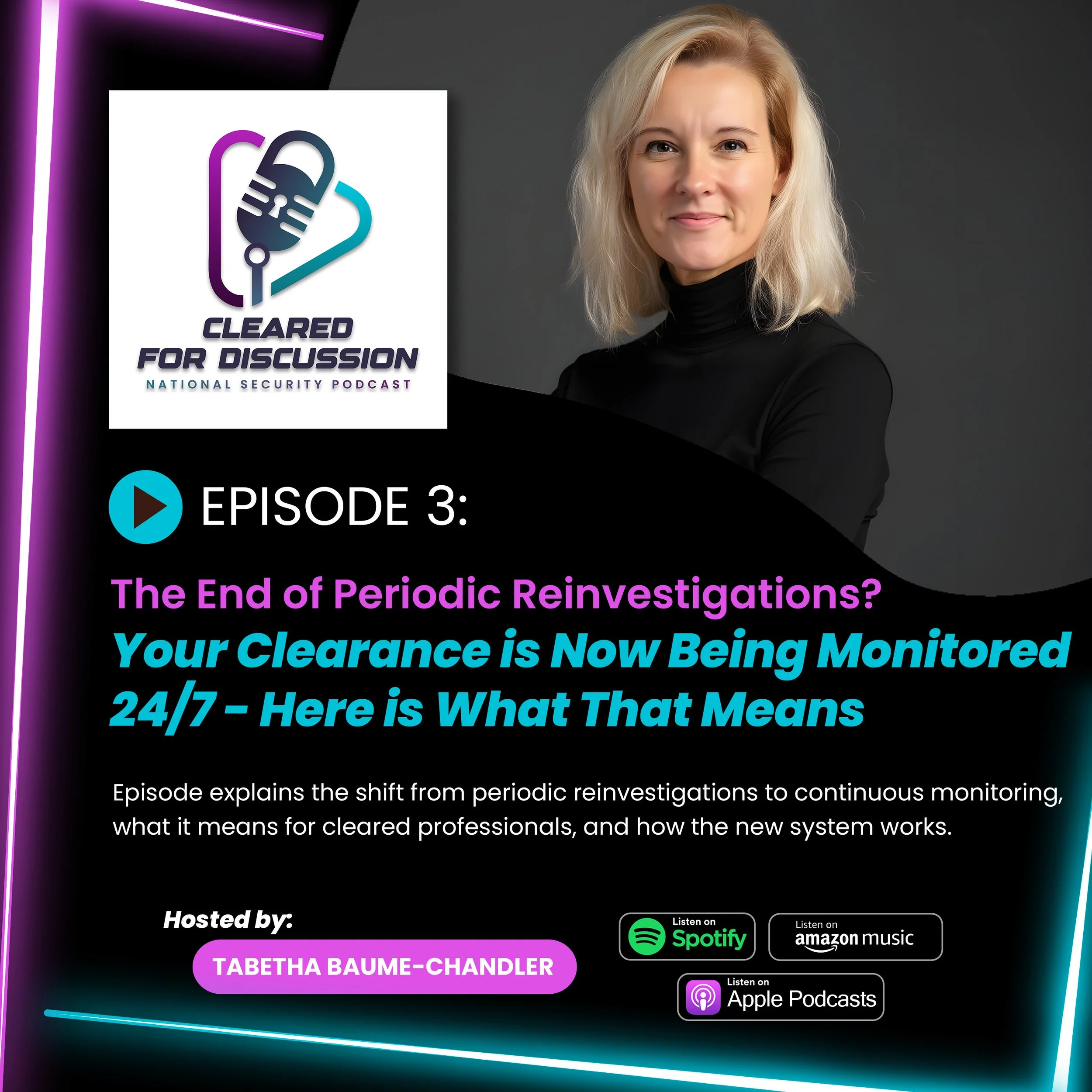
EPISODE 3 | The End of Periodic Reinvestigations
In this impactful third episode of the CFD Podcast, host Tabetha explores one of the most transformative shifts in the world of security clearances—the move from periodic reinvestigations to continuous vetting.
Listeners are walked through what this change means in real terms for cleared professionals, from real-time monitoring of data sources to the increased focus on early intervention, mental health support, and enhanced career mobility.
-

EPISODE 4 | Iran in Focus
In this timely episode, Tabetha Baume-Chandler unpacks DHS’s June 2025 bulletin warning of Iran-linked threats to cleared professionals. From cyberattacks and social engineering to potential inspired violence, listeners gain a clear understanding of how the Iran conflict directly impacts national security roles.
The episode offers practical steps to strengthen personal digital hygiene, assess risk exposure, and remain vigilant—without falling into paranoia. A must-listen for those in defense, intelligence, or homeland security.
-
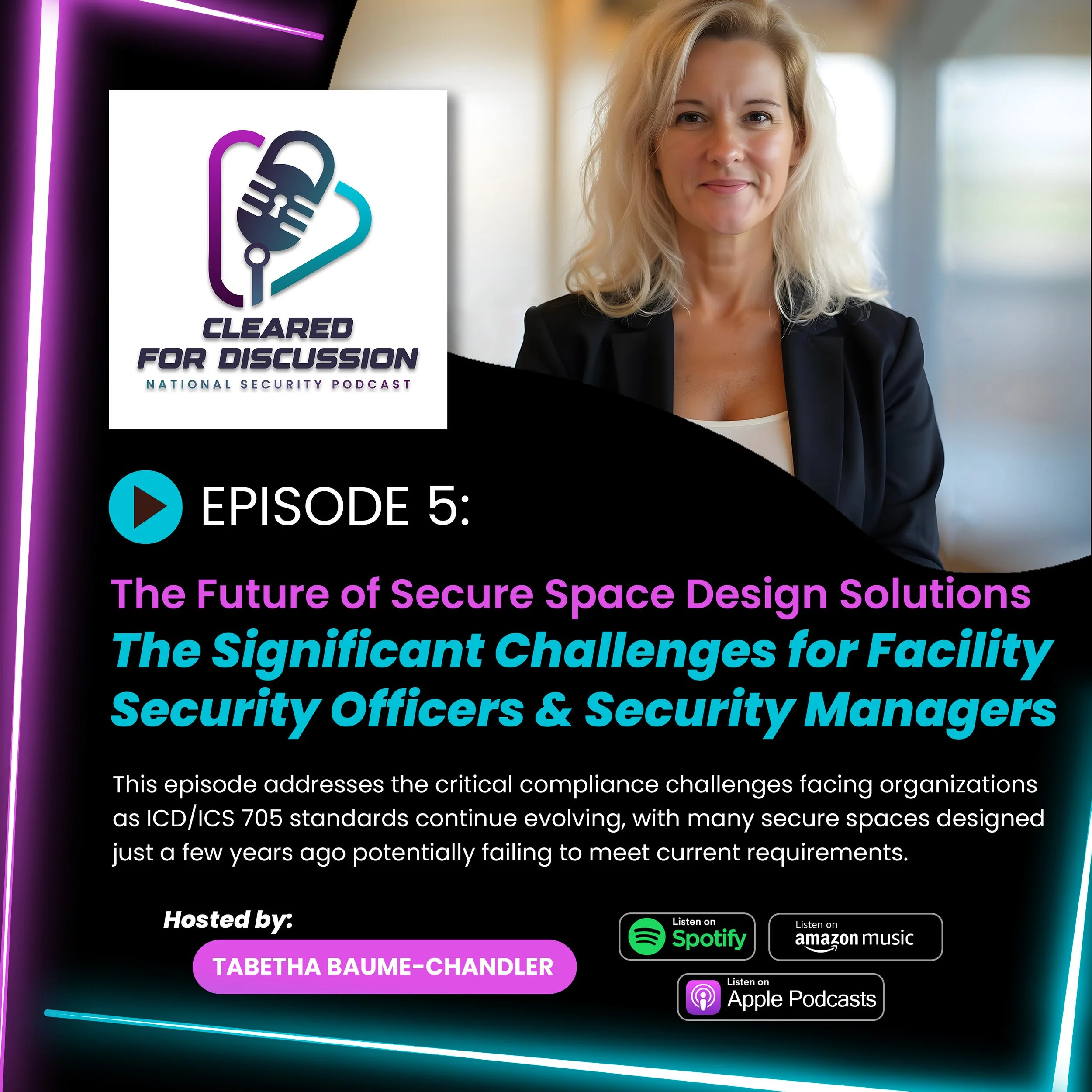
EPISODE 5 | The Future of Secure Space Design Solutions
In this episode, Tabetha Baume-Chandler warns security professionals that outdated secure space designs may no longer meet updated ICD-705 standards. She explains why waiting for problems to surface is risky and costly, and urges organizations to shift from reactive to proactive compliance.
With emphasis on continuous monitoring, future-proofing, and working with expert consultants early, this episode is a crucial reminder: in secure space management, staying ahead is the only safe option.
-

EPISODE 6 | Reclaiming Our Unity
In this special remembrance episode, Tabetha Baume Chandler reflects on the 24th anniversary of September 11th and the unity that followed in its aftermath. Instead of analyzing current threats, she speaks about the deeper meaning of patriotism — not as blind loyalty or partisan weaponry, but as a genuine love of country, its freedoms, and its people.
She warns that America has drifted into division, with political tribalism overshadowing unity, and reminds listeners that adversaries exploit this discord. By recalling the spirit of togetherness after 9/11, she urges Americans to rediscover real patriotism: honoring the Constitution, respecting differences, and choosing unity over division.
This episode is a call to action for every citizen — to remember that true patriotism transcends party lines and is the cornerstone of a strong, free, and secure America.
-
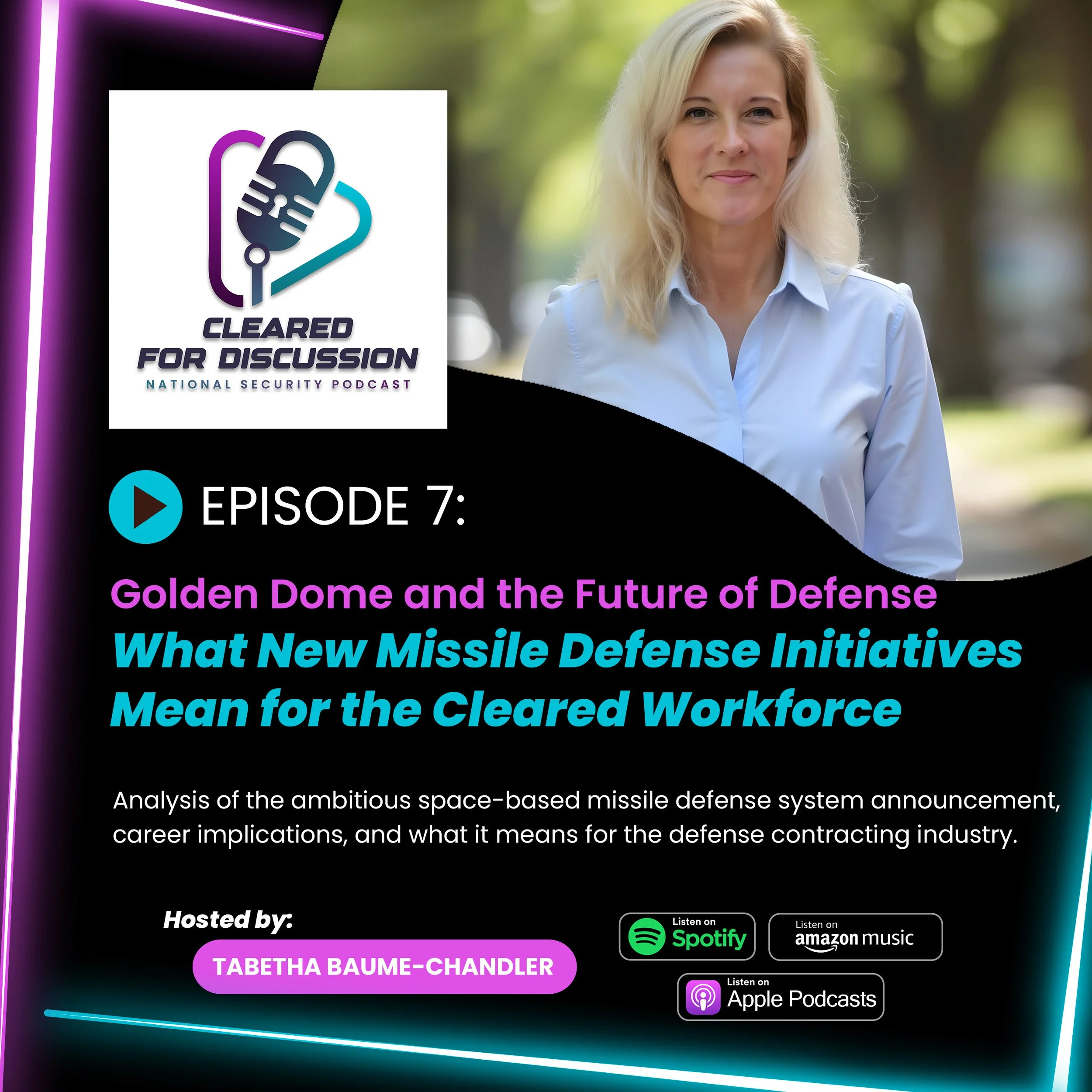
Episode 7 | Golden Dome and the Future of Defense
In this episode, Tabetha Baume Chandler explores the Golden Dome National Ballistic and Cruise Missile Defense System, one of the most ambitious defense initiatives announced this year. More than an incremental upgrade, the Golden Dome envisions a space-based, layered defense system designed to counter growing missile threats from China, Russia, and North Korea.
She outlines the massive opportunities this program presents for cleared professionals across aerospace, satellite operations, missile defense, advanced computing, and AI. From major defense primes to innovative startups, the Golden Dome could reshape the defense contracting landscape for decades.
This episode highlights a generational opportunity for cleared professionals to contribute to cutting-edge technologies that will define national security in the coming decades.
-
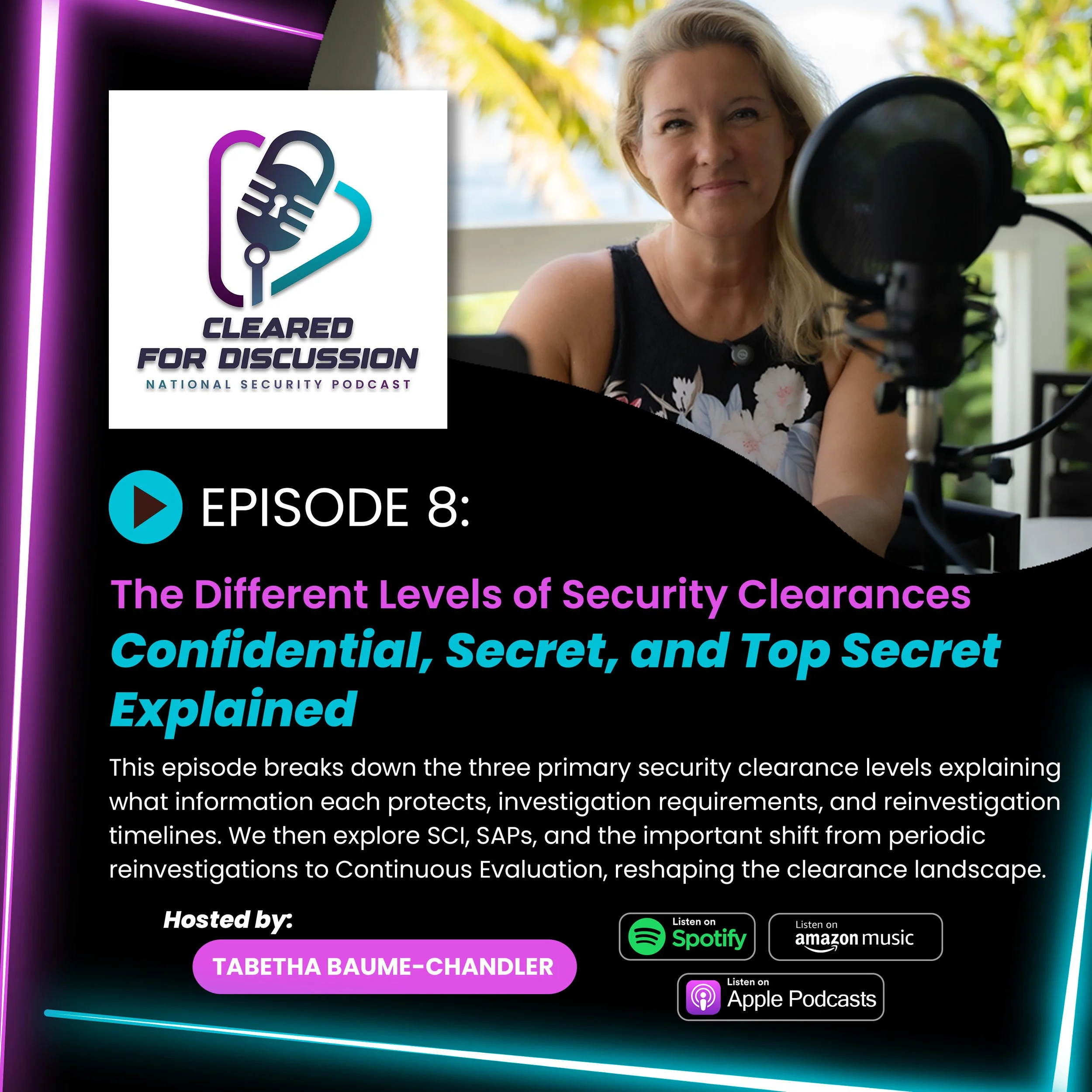
EPISODE 8 | The Different Levels of Security Clearances
In this episode, Tabetha Baume Chandler explains the three main clearance levels — Confidential, Secret, and Top Secret — along with SCI and SAPs, highlighting what they protect and how they’re obtained. She details the investigation process, from background checks to polygraphs, and stresses that trustworthiness, finances, and conduct all factor into eligibility.
Tabetha also notes the shift from periodic reinvestigations to continuous evaluation, making clearance maintenance an ongoing responsibility. Her message is clear: a security clearance is a privilege that demands daily vigilance and commitment to protecting national security.
-
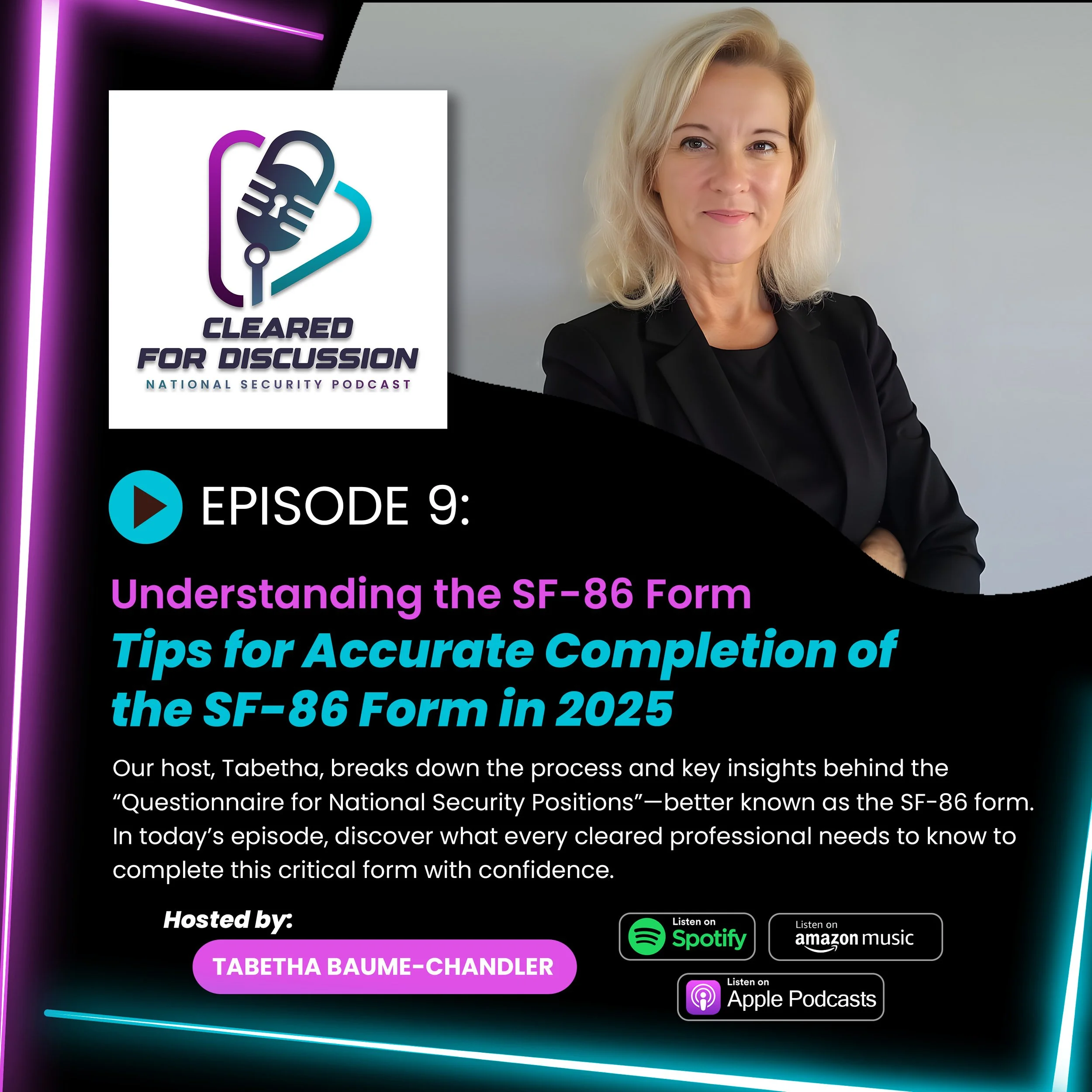
EPISODE 9 | Understanding the SF-86 Form
In this episode, Tabetha walks listeners through the full journey of obtaining a security clearance, breaking it down step by step to make the intimidating process more manageable. She begins with the role of the Facility Security Officer (FSO), who acts as a guide, mentor, and advocate—helping applicants prepare key details like addresses, employment history, foreign contacts, and fingerprinting before tackling the lengthy SF-86 form.
Tabetha then outlines the formal steps: establishing the clearance requirement, completing the SF-86, undergoing the investigation (Tier 3 for Secret/Confidential and Tier 5 for Top Secret), and adjudication based on the “whole person concept.” She also explains the types of polygraphs, the 13 adjudicative guidelines, and the final clearance decisions, including interim clearances and appeal rights if denied.
-
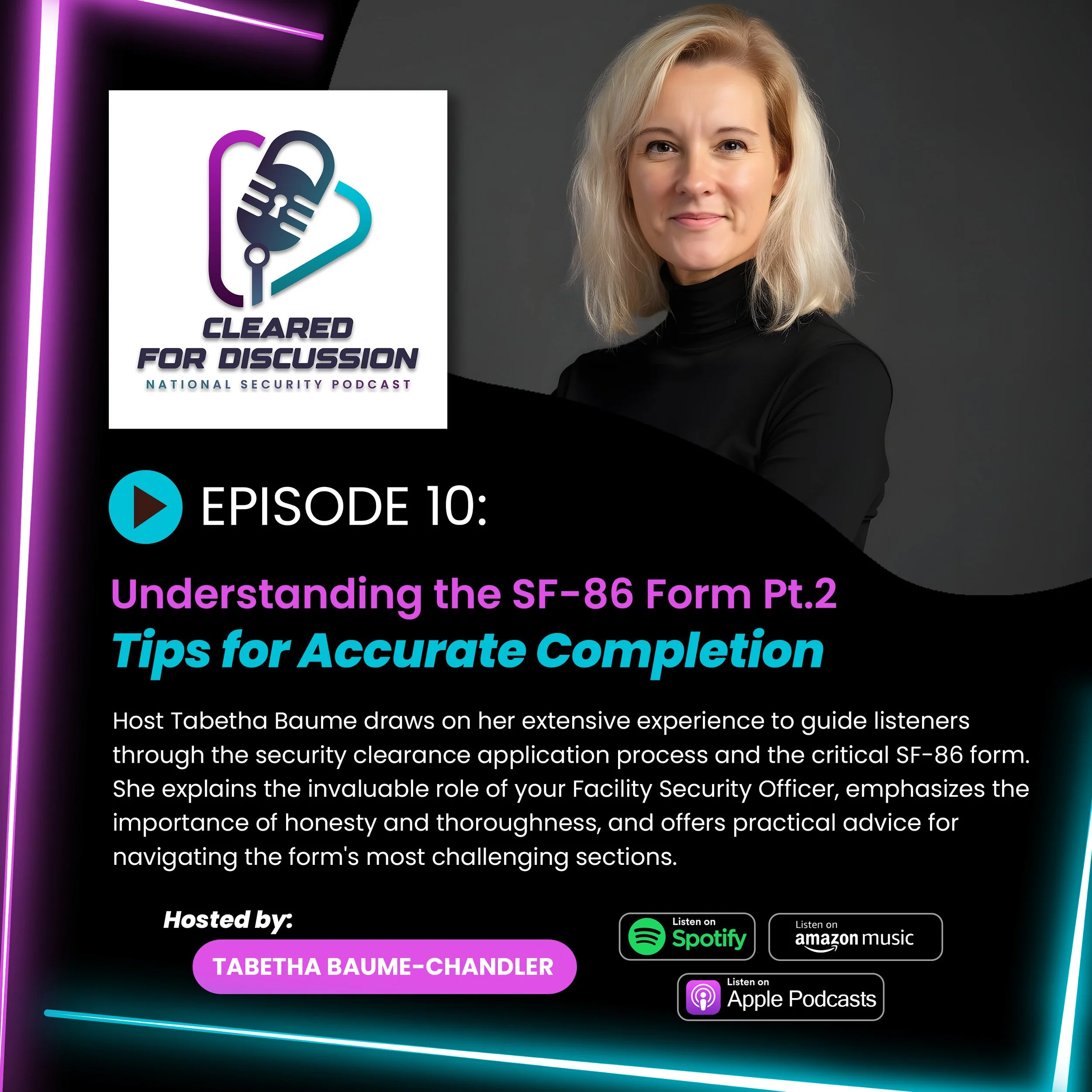
EPISODE 10 | Understanding the SF-86 Form Pt.2
In this episode, Tabetha Baume draws on her experience reviewing over 100,000 security clearance forms to demystify one of the most complex steps in the clearance process—the SF-86. She begins by highlighting the vital role of the Facility Security Officer (FSO), describing them as the applicant’s guide through an often intimidating process. A good FSO, she explains, helps applicants understand every section of the form, avoid common pitfalls, and feel comfortable asking questions without fear of judgment.
Tabetha then walks listeners through key best practices for completing the SF-86: be honest, thorough, and patient. She offers specific advice for difficult sections like residence history, foreign contacts, finances, and mental health, reminding applicants that transparency and preparation prevent costly delays. Above all, she reassures listeners that with integrity, careful attention, and the support of their FSO, anyone can successfully complete the process. The episode closes with a reminder to veterans and military families about Code of Support Foundation: PATRIOTink, a free national resource database from the Code of Support Foundation.
-

EPISODE 11 | Security Clearance Denials
In this episode, Tabetha Baume breaks down the top five reasons applicants are denied security clearances—financial issues, personal conduct, drug involvement, foreign influence, and alcohol use—and explains how to avoid them.
She highlights that financial problems account for nearly 40% of denials, stressing honesty, repayment plans, and documentation as key to mitigation. Dishonesty during the clearance process is another major disqualifier, making full transparency essential. Drug use, including marijuana, remains a serious concern under federal law, while foreign ties and alcohol-related incidents must be handled with openness, responsibility, and evidence of improvement.
-
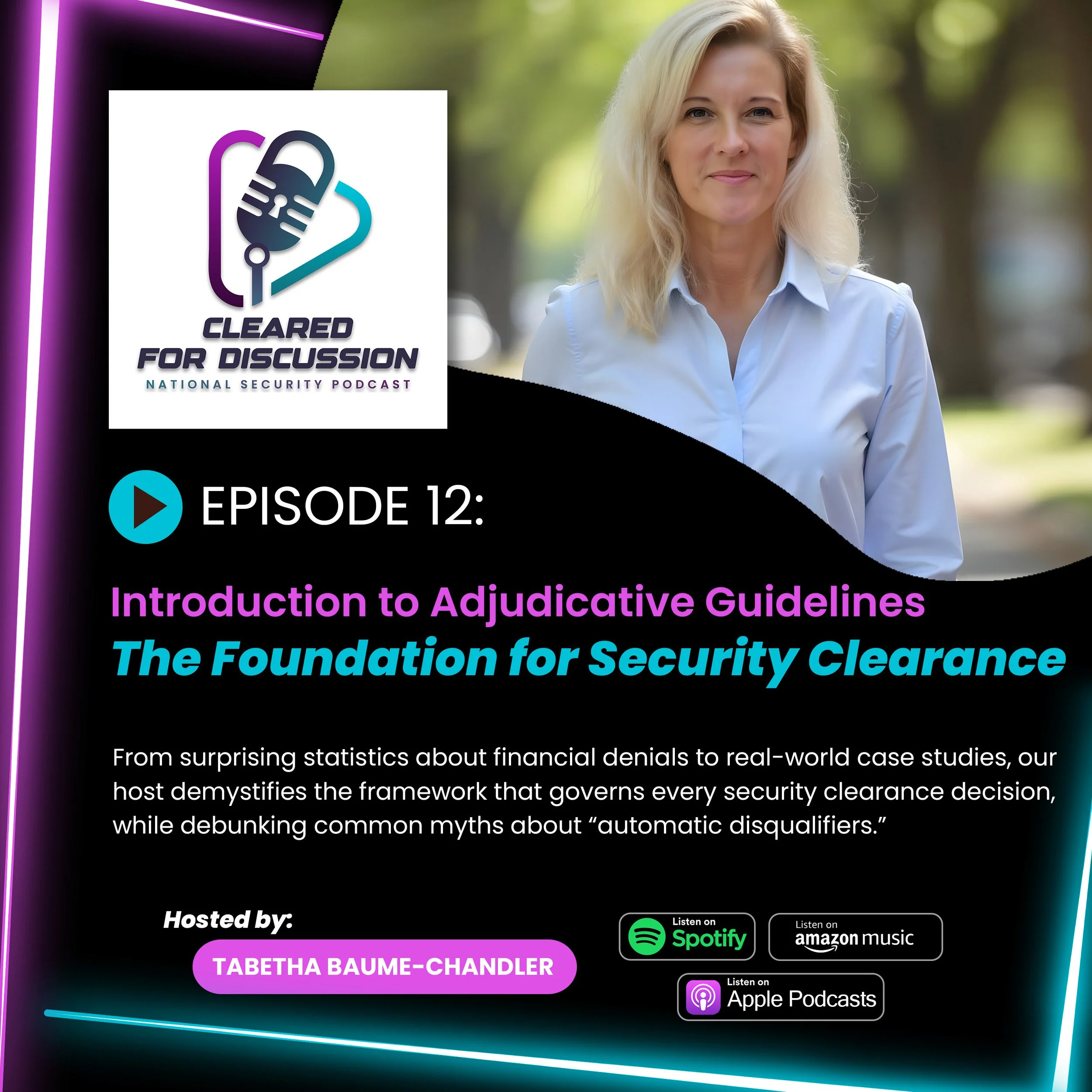
EPISODE 12 | Introduction to Adjudicative Guidelinesm
In this episode, Tabetha Baume breaks down one of the most fundamental yet misunderstood parts of the clearance process — the Adjudicative Guidelines. She explains how, before 1987, agencies used inconsistent rules to evaluate security clearances until the government created 13 standardized guidelines to assess trustworthiness. Updated as recently as 2017, these guidelines help adjudicators weigh risks in areas such as financial responsibility, personal conduct, foreign influence, drug use, and psychological conditions while considering the “whole person” — not just isolated mistakes.
Tabetha uses real-world examples, like an applicant who overcame debt through honesty and repayment, to show that most issues can be mitigated through responsibility and transparency. She also debunks common myths — that one mistake or imperfection automatically means denial — reminding listeners that adjudicators seek honesty, reliability, and evidence of growth, not perfection. By understanding these guidelines, applicants can better navigate the process and strengthen their chances of approval.
-
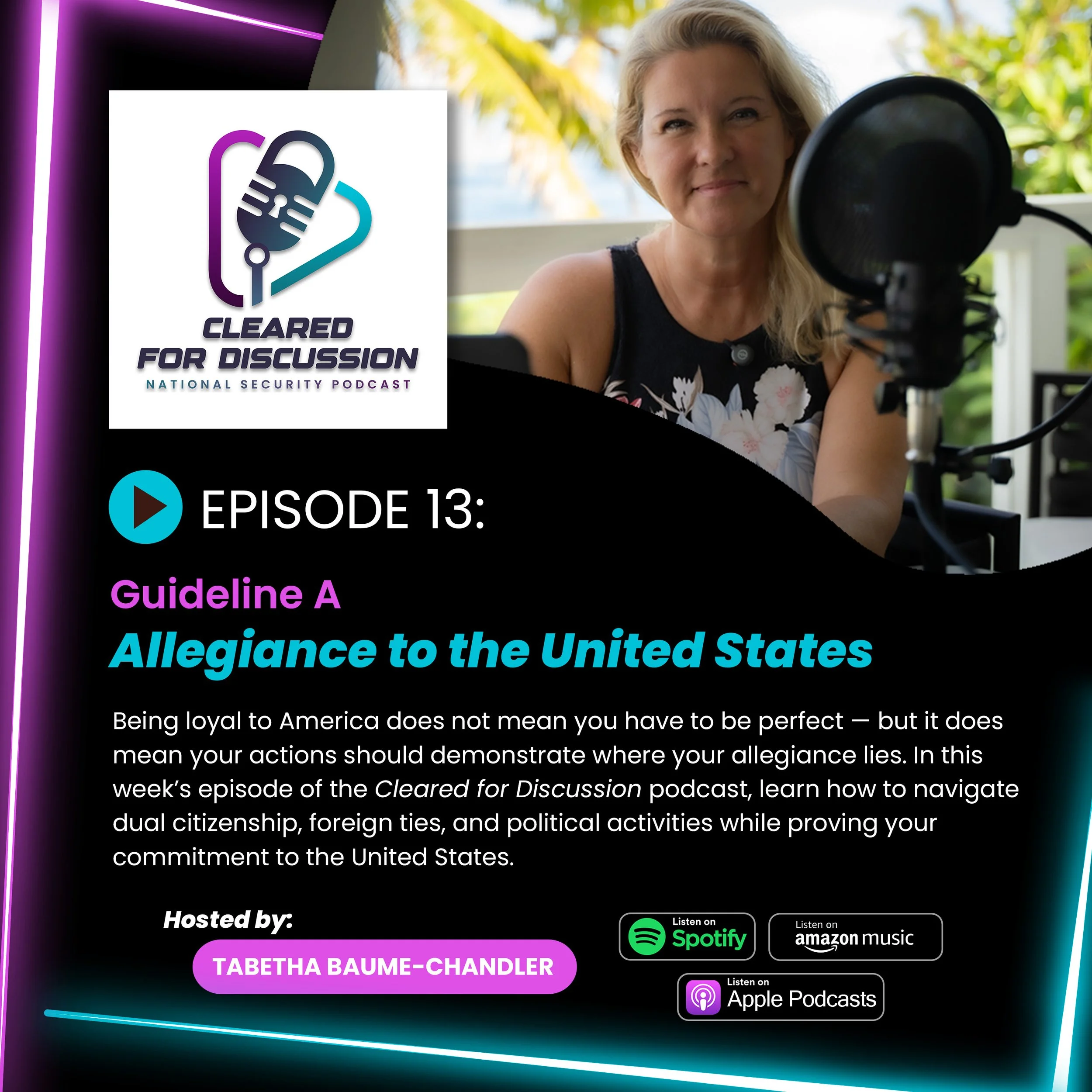
EPISODE 13 | Guideline A
In this episode, Tabetha Baume begins a deep-dive series on the 13 adjudicative guidelines, starting with Guideline A: Allegiance to the United States. She explains that allegiance is about trust — ensuring an applicant will protect American interests, not about blind patriotism. Using real-world examples and espionage cases, she highlights how divided loyalties or extremist associations can raise serious security concerns, while lawful activism, dual citizenship, or foreign heritage do not.
Tabetha debunks common myths and emphasizes that transparency, honesty, and strong ties to the U.S. are key to overcoming concerns. Ultimately, adjudicators aren’t looking for perfection but for integrity, reliability, and clear allegiance when it matters most.
-
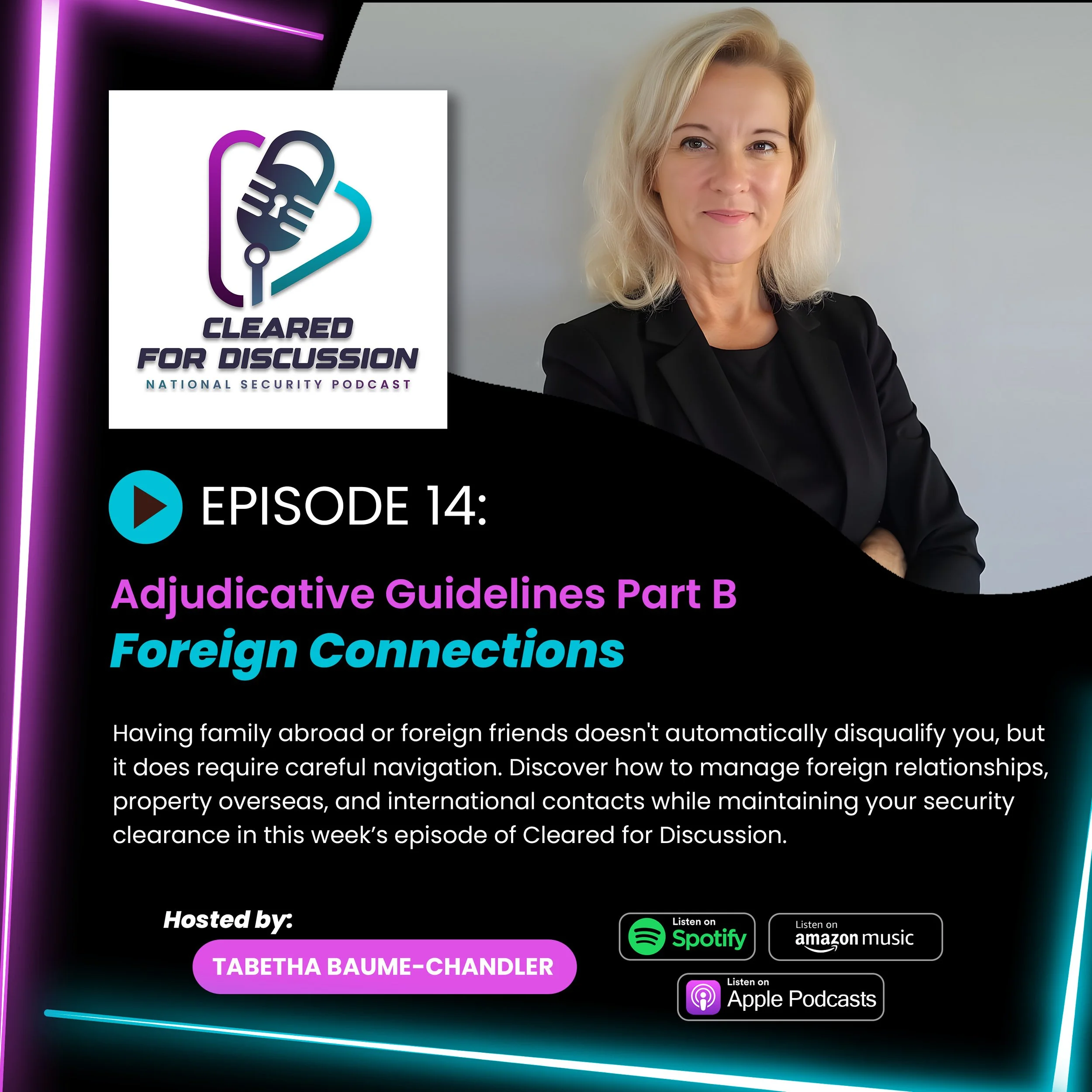
EPISODE 14 | Adjudicative Guidelines Part B
In this episode, Tabetha Baume unpacks Adjudicative Guidelines Part B: Foreign Influence, one of the most common and misunderstood parts of the clearance process. She explains that the issue isn’t about loyalty but about vulnerabilities created by foreign connections that adversaries could exploit.
Using real cases—like applicants with family abroad, foreign spouses, property, or international research—Tabetha shows how honesty, strong U.S. ties, and transparency can mitigate concerns. She emphasizes full disclosure on the SF-86 and reminds listeners that adjudicators look at the “whole person,” not isolated circumstances.
The takeaway: foreign connections are normal, but concealment or carelessness is not. Be honest, document everything, and demonstrate that your life and loyalty are rooted in the United States.
-

EPISODE 15 | Adjudicative Guidelines Part C
In this episode, Tabetha Baume explores one of the most frequently misunderstood topics in the clearance process — Foreign Influence. She clarifies that this guideline isn’t about questioning a person’s loyalty, but about identifying potential vulnerabilities that foreign relationships or assets might create.
Through real-life examples involving family members overseas, foreign property, and international collaborations, Tabetha explains how honesty, transparency, and strong U.S. ties can resolve most concerns. She emphasizes full disclosure on the SF-86 and reminds listeners that adjudicators evaluate the whole person, not isolated factors.
-
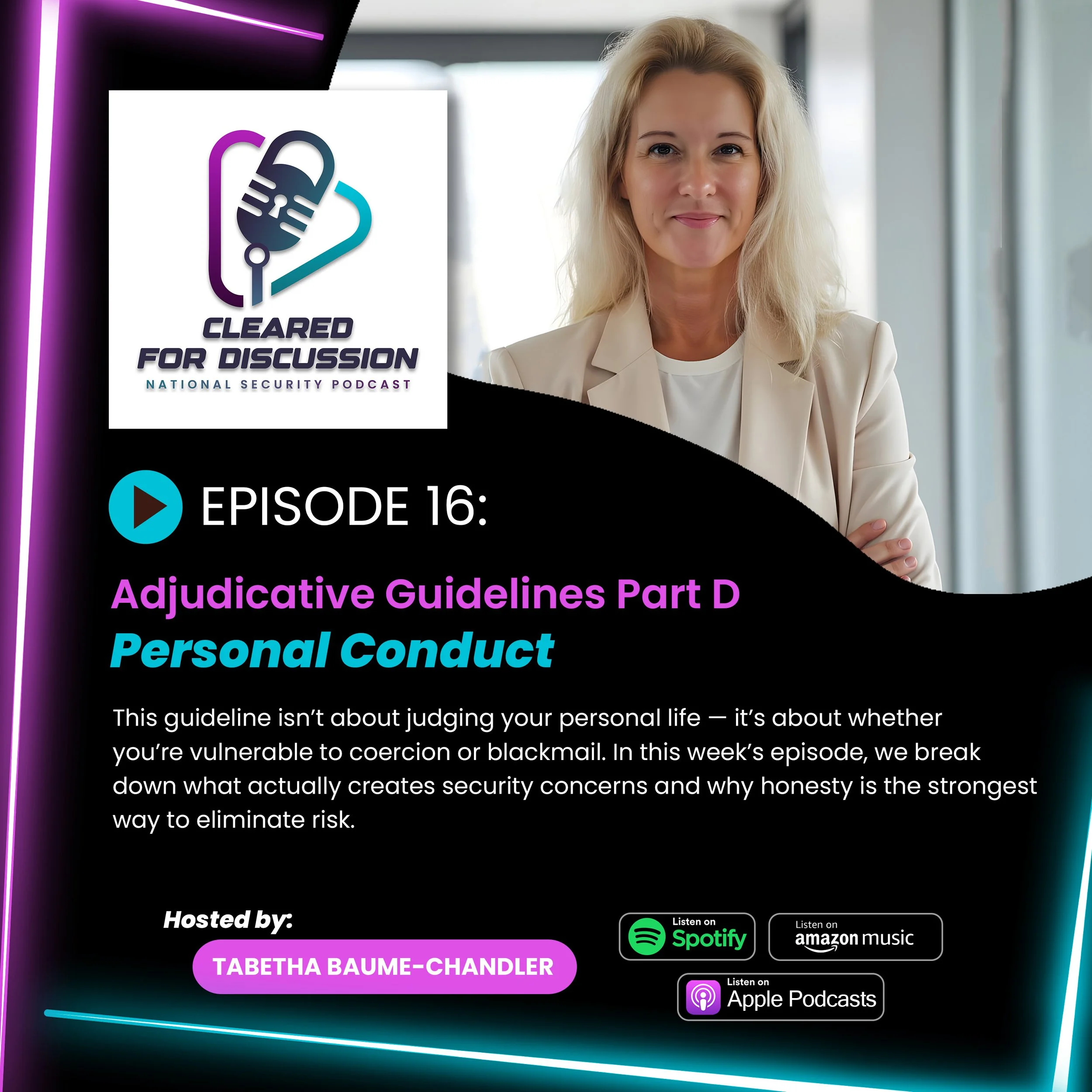
EPISODE 16 | Adjudicative Guidelines Part D
In this episode, Tabetha Baume tackles one of the most sensitive and misunderstood areas of the clearance process. She clarifies that Guideline D is not about judging someone’s orientation, lifestyle, or consensual adult relationships. Instead, it focuses on one core issue: whether aspects of a person’s sexual behavior create vulnerability to coercion, exploitation, or blackmail.
Through detailed real-world scenarios involving affairs, past sex work, dismissed charges, and consensual alternative lifestyles, Tabetha explains what does and does not create a security concern. She emphasizes that the government evaluates secrecy, criminality, judgment, and blackmail vulnerability, not morality. Tabetha also reinforces that honesty, openness, and taking responsibility are the strongest mitigating factors. She reminds listeners that adjudicators apply the whole person concept, looking at context, rehabilitation, and current behavior rather than isolated mistakes or outdated stigmas.


